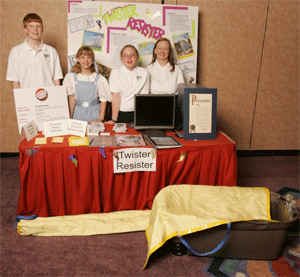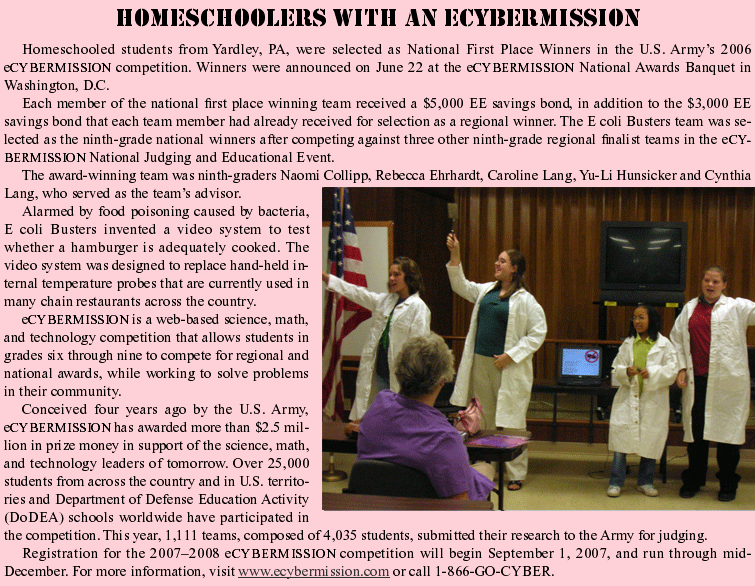Annual Contests for Homeschoolers
By Mary Pride
Printed in Practical Homeschooling #73, 2006.
 Entering your homeschooler into one of these contests might be the key to unlocking their inner talents.
Entering your homeschooler into one of these contests might be the key to unlocking their inner talents.

| 
|
When did you first become aware of homeschooling? For many people, their
first exposure to homeschooling was reading or watching the announcement
that a homeschooler had won a contest.
Over the years homeschoolers have won many high-profile national
contests. Here are just a few:
- The Scripps National Spelling Bee. First homeschooled winner:
Rebecca Sealfon in 1997. Three short years later, homeschoolers swept
the Spelling Bee, winning first, second, and third places!
- The National Geographic National Geography Bee. First
homeschooled winner: David Beihl in 2000.
- The Intel Science Talent Search. In 1999, Rio Bennin became the
second homeschooled finalist, earning fifth place overall.
- The Siemens Westinghouse Competition in Math, Science, and
Technology. First homeschooled winner: Michael Viscardi in 2006 (see
article in PHS #70).
- The Toshiba ExploraVision contest. First homeschooled winners:
the “Providence Academy” team of 2001.
 Wins on a state or even local level also often show up in local
newspapers or on the local TV news. What you see in Practical
Homeschooling’s “Show & Tell” column is just the tip
of the iceberg. We could literally fill each issue with the
accomplishments of homeschooled students.
Wins on a state or even local level also often show up in local
newspapers or on the local TV news. What you see in Practical
Homeschooling’s “Show & Tell” column is just the tip
of the iceberg. We could literally fill each issue with the
accomplishments of homeschooled students.
You Don’t Have to Win to Be a Winner
There’s a reason so many homeschoolers have been winning contests:
they entered! Savvy homeschool parents know that whether or not your
child gets to the finals or wins, contests provide a lot of
homeschooling bang for your buck.
Sue Richman of Pennsylvania Homeschoolers lists eight great benefits
gained by entering contests:
- Learning to cooperate with others
- Ease of organizing a group activity
- Provides focus for getting a group together
- Excellent, often free guidelines for developing an area of
curriculum that perhaps had been formerly pushed to the background
- An unusual chance to let our kids measure themselves against
kids who are traditionally schooled
- Shifting the burden of setting project parameters from Mom and
Dad to the contest, enabling parents to shift to a “coach”
role
- Team contest accomplishments look great on a high-school
transcript
- Great public relations for homeschooling
In addition, Laurie Bluedorn of Trivium Pursuit points out that contests
develop research skills and other study skills. They also develop
character qualities such as perseverance and diligence.
Which Contest Is Right for Your Child?
First off, if the contest organizers ask for money, unless it’s a
huge, reputable company backing the contest and the entry fee is small
and reasonable, skip it. You shouldn’t have to pay much, if
anything, to enter an individual contest.
Team contests sometimes have team registration fees, especially those in
the areas of invention and engineering. These can be hefty (or
outrageous, depending on how you look at it).
The most expensive I’ve seen to date is the FIRST Robotics
Competition. They want:
- $6,000.00 fee for participation in one Regional Event, the
Kit of Parts, associated materials and support
- $4,000.00 for participation in each additional Regional
Event
- $5,000.00 fee to participate in the Championship

Each fee covers the entire team, but it doesn’t include travel
costs, which can also be quite substantial.
 My theory is that the fee structure was based on the assumption that you
are a public-school team and thus businesses will be eager to sponsor
you and pay the fees. Businesses love the brownie points they get for
supporting local public schools. No such brownie points exist for
supporting homeschool teams—and in fact, this kind of sponsorship
might seem disloyal to public schools. So unless you are existing
homeschool team with a winning record, drumming up business sponsorship
for this kind of contest can be difficult.
My theory is that the fee structure was based on the assumption that you
are a public-school team and thus businesses will be eager to sponsor
you and pay the fees. Businesses love the brownie points they get for
supporting local public schools. No such brownie points exist for
supporting homeschool teams—and in fact, this kind of sponsorship
might seem disloyal to public schools. So unless you are existing
homeschool team with a winning record, drumming up business sponsorship
for this kind of contest can be difficult.
Don’t let this gold-plated type of competition scare you away.
Most cost little or nothing. And starting small and spending little is a
good way to go if your student has never entered an academic competition
before.
Laurie Bluedorn suggests that your child’s first competition
should coincide with your child’s interests. It takes a while to
get into the “swing” of planning to meet contest deadlines.
An art or essay contest is a good first choice. And of course you are
free to watch other children competing in some of the more strenuous
contests, such as the spelling bee. This might motivate your child to
enter next year!
Laurie then suggests that the second year, your student might want to
attempt one of the “project” contests, such as a science
fair, invention project, or National History Day.
By the third year you will have become a contest pro. Now you have the
option to make contests a major part of your curriculum.
Finding a Contest
Many competitions start at the local level. Your local support group
likely sponsors science fairs, art competitions, a math league, and
other “first steps” on the competition trail. If you win at
this local level, often you can advance to a state or regional level.
This is how the National Spelling Bee and National Geography Bee work,
for instance.
If your local homeschool group doesn’t sponsor competitions, try
contacting your state group. Often they can put you in contact with
others who are forming homeschool teams for math competitions, rocketry
competitions, robotics competitions, and so forth.
For most individual competitions, you basically just need to find the
competition website and download the rules and entry form. These will
acquaint you with the deadlines as well.
While we can’t list every single contest for homeschoolers in this
short article, we have pointed out a couple of nifty team contests in
the sidebars. To find out where you can locate dozens and dozens of
additional team and individual contests, keep reading!
Where to Find Contests
You can find an excellent article on our website about essay contests
for teens, including a list of contests to enter, at
www.home-school.com/Articles/essay-contests-for-teens.php. An equally excellent
article about math contests for homeschoolers, again with a list of
contests with accompanying descriptions, can be found at
www.home-school.com/Articles/phs37-richmans.html. (When typing this in,
be sure to include the capital “A” in
“Articles”!) Both articles are by Howard and Sue Richman of
Pennsylvania Homeschoolers, whose homeschooled children have an amazing
track record with contests of all kinds.
A fabulous list of engineering contests for kids is at
www.ideafinder.com. There is also an extensive
list of contests, with contact information and “insider”
descriptions of each contest, in Mary Pride’s Complete Guide to
Getting Started in Homeschooling.
Now here is a small sample of contests homeschoolers can enter:
Arbor Day National Poster Contest.
www.arborday.org States have different entry deadlines.
Federal Junior Duck Stamp Contest. www.fws.gov/juniorduck
Homeschoolers have done well in this one!
International Songwriting Competition. www.songwritingcompetition.com
Amazing publicity, great prizes. Categories include Pop/Top 40, Rock, AAA, Adult
Contemporary (AC), Country, Americana, R&B/Hip-Hop, Blues, Dance/Electronica,
Folk/Singer-Songwriter, Jazz, World, Latin, Instrumental; Children's Music;
Gospel/Christian, Comedy/Novelty
National History Day Contest.
www.nationalhistoryday.org/NationalContest.htm District contests usually
are in February or March. State contests occur in April or May. For
students in grades 6–12.
American Legion Oratorical Contest. www.legion.org/?section=prog_evt.
Select “National Oratorical
Contest.” For grades 9–12. Contact your local chapter of the
American Legion for the first step. The top three national finalists win
big scholarships.
National Model Rocketry Competitions. Check www.nar.org for current
sanctioned competition dates. Students must join NAR to compete.
ThinkQuest. www.thinkquest.org Ages 12–19. Website-building
contest with a team of 2–3 people. Large scholarship prizes;
“techie” sites tend not to win. Huge number of entrants.